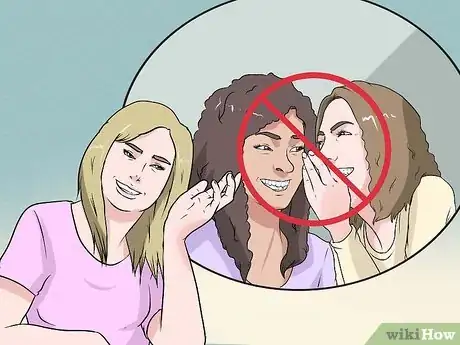This article was co-authored by Erin Conlon, PCC, JD. Erin Conlon is an Executive Life Coach, the Founder of Erin Conlon Coaching, and the host of the podcast "This is Not Advice." She specializes in aiding leaders and executives to thrive in their career and personal lives. In addition to her private coaching practice, she teaches and trains coaches and develops and revises training materials to be more diverse, equitable, and inclusive. She holds a BA in Communications and History and a JD from The University of Michigan. Erin is a Professional Certified Coach with The International Coaching Federation.
There are 10 references cited in this article, which can be found at the bottom of the page.
This article has been viewed 739,063 times.
Nobody wants to be a loser. Luckily, with just a little time and energy, no one has to! No matter who you are, turning your life around can be as easy as deciding that you're going to draw a line in the sand and make a change right now. Don't let people tell you you're a loser — instead, ignore their pettiness and work to be the best, happiest person you can be. You can become a winner. See Step 1 below to get started!
Steps
Taking Charge of Your Life
-
1Value yourself. If there's only one thing you do to improve yourself, make it this. When people genuinely value and respect themselves, it's obvious to everyone around them.[1] These people may not all be bubbly and effervescent, but they all exude a sense of self-worth and confidence that makes it obvious that they don't consider themselves losers. Start by thinking of all of the good, valuable things about yourself — things you're good at, ways you enjoy yourself, and so on. Knowing that you have your own unique strengths and talents makes it so much easier to love yourself and so much harder to pay any attention to people who may try to put you down.[2]
- If you're feeling down and you're having trouble finding value in yourself, try the following exercise. Take a piece of paper and draw a vertical line down the middle. At the top of one side, write "pros", and at the top of the other, write "cons". Begin to write your positive and negative attributes in the appropriate columns. For each "con" you write, try to write two "pros". When you've filled your "pros" column, stop and review what you've written down. Your positive qualities should dwarf your negative ones.
- Remind yourself that you're a strong, capable person who can get through anything.[3]
-
2Devote time to your hobbies and interests. People who spend time doing what they love have an easier time loving themselves. The fun and self-satisfaction you get from indulging your hobbies and interests is great for building confidence and increasing your sense of self-worth. If you're not already doing so, try to spend a little time every day or week doing something positive and fun that you love. If you can do your hobbies with other people, even better — your friends can take the entertainment level of your hobbies from "fun" to "let's do this again as soon as we can".
- This advice is especially true if your work or school situation isn't ideal. It can be tricky to find a new job that you love or get a new group of friends at school, but it's not very hard, for instance, to spend a little time practicing piano every evening if you love music.
- Try to tend towards skill-based activities that you can improve at over time. While watching TV and playing video games can be fun, they don't usually offer any serious potential for self-improvement.
- If you don't have any go-to hobbies, try doing something creative, like painting or drawing.[4]
Advertisement -
3Stay physically active. Believe it or not, the way you treat your physical body can have a noticeable effect on the way you view yourself emotionally. Exercise has been proven to cause the release of chemicals called endorphins in the brain which can help you feel positive and upbeat. Frequently devoting a little time and energy to your fitness can help you feel more relaxed, confident, and energetic. Additionally, exercise is known to help treat depression. These qualities all make exercise a great option for people looking to increase their overall mood.[5]
- To be perfectly clear, you don't need to have a body like a professional athlete to be happy. Though everyone's fitness needs are different, the Centers for Disease Control recommend that adults should aim for about 1 1/4 hours - 2 1/2 hours of cardio exercise per week (depending on its intensity) in addition to strength-training exercise on two or more days each week.[6]
-
4Work hard at your job or school. It's easiest to feel good about yourself if you're excelling at your personal and professional goals. Unless you're one of the fortunate few who can afford to live a life of leisure and luxury, odds are that you have some sort of professional obligations — for most people, this means work or school. Apply yourself when you tackle these responsibilities. Not only can this help you gain a better self image, but it can also lead to promotions, good grades, and so on, which in turn will increase your sense of self-worth. You don't have to kill yourself with effort to feel satisfied with yourself (for instance, don't miss the birth of your first child to squeeze in a few more hours at the desk), but you should make a habit of working hard and doing a great job at whatever you do.
- If you've recently lost your job, don't be ashamed — instead, work hard to find another, better one. Don't forget the old cliché: "Finding a job is a job."
- Beware of people who encourage you to neglect your work or school in favor of short term fun. While a little recreational activity is always a great idea, someone who consistently abandons their responsibilities for cheap thrills is the very definition of a loser.
-
5Be responsibly social. People are social animals — we're meant to spend time with one another. In fact, social withdrawal is generally seen as one of the most common signs of depression. If you've been feeling down on yourself lately, reaching out to friends or family members you haven't seen in a while can be a great way to get negative thoughts back on track. Spending just a single afternoon having a great time with people you're close to can completely re-orient your outlook on life.[7]
- While it's almost always a great idea to spend time hanging out with friends, try not to dwell exclusively on negative thoughts and emotions when you're with them. Good friends should be more than happy to talk with you about any serious problems you have, but making a habit of "dumping" your emotional issues on your friends can be very fatiguing for them. Instead, try talking to family members, role models you trust, like teachers, bosses, or religious figures who know you, or professional counselors.
-
6Plan for your future. People who have their long-term responsibilities in order have an easier time enjoying themselves in the short term because they don't have to worry as much about the problems that tomorrow might bring. If you're working, don't put off saving for retirement — you'll never regret starting to save money at an early age, even if you can only afford to put away a little at first (for more information, see How to Save Money). If you're in school, spend a little time thinking about your plans for continuing education or employment. Ask yourself, "Will I proceed to the next level of education when I'm done with school, or will I start looking for a job?"[8]
- If you know the answer to either of these two questions, start looking for jobs or schools you might like. It's never to early to start planning for your future. Plus, you can always change your plans if you start to feel differently.
-
7Surround yourself with good people. The people we hang out with can shape us. They can change our priorities, introduce us to people and things we wouldn't otherwise have encountered, and generally make our lives richer. However, if we spend a lot of time hanging out with people who have no goals, no hobbies, and negative attitudes about life, it's easy to get a distorted view of what's important. If you have a sneaking suspicion that you're spending your personal time, don't be afraid to limit the amount of time you spend with these people until you get your own life in order. You may find that once you've sorted things out for yourself, you suddenly are less interested in spending time with these people anyway. If you're unsure, look for these unhelpful attitudes in the people you're spending your time with:[9]
- Negative self-images (e.g. comments like, "Why can't I do anything right?")
- Negative views of you (e.g. comments like, "Ugh, you again.")
- A lack of personal hobbies or interests
- Hobbies and interests solely related to drug use, "slacker" activities, etc.
- An inactive lifestyle (e.g. lots of time spent on couch, watching TV, etc.)
- A lack of goals or personal direction
-
8Don't listen to the haters. Life's too short to worry about what petty people think of you. If someone's making you feel bad about yourself with the things they are saying, you don't have to accept it. Instead, let them know how their comments make you feel. Saying something simple like, "Hey, knock it off. Quit being a jerk!" is usually enough to let most people know that you don't appreciate their negativity. If they won't change, stop hanging out with them! You shouldn't feel any obligation to spend time with people you hate (outside of required functions like weddings, birthday parties, and so on, of course).
- While you won't want to give too much weight to the negative comments of others, you won't want to disregard the advice of other people entirely. If someone you know and respect expresses their concern about you, listen. It may be unwarranted, but it may be illuminating — the only way you'll know is to listen.
Mastering Social Situations
-
1Have confidence in your abilities. The single biggest thing most people who view themselves as losers can do to improve their social situation is to get a greater sense of self-confidence. This is related to having a good sense of self-worth. When you believe that social situations aren't scary and that you have what it takes to have a good time talking to people you don't know, it becomes so much easier to actually do it. There are many, many guides on the internet that can give you different instructions for improving your self-confidence (including wikiHow's How to Be Confident). Below are just a few of the most common tips you'll find:
- Spend a few minutes imagining yourself having a great time in an upcoming social situation. Imagine what you're saying and what you're doing, then use this as a guide.
- View social failures as instances in which you learned a lesson.
- Listen to exciting or uplifting music to "pump yourself up" before social situations.
- Don't give yourself to dwell on what could go wrong. Just jump in to social situations that have you worries!
- Ask yourself, "What's the worst that could happen?" In most social situations, the answer is, "Not much."
- Remember: confidence comes from learning that you can survive anything, even if you don't succeed right away.[10]
-
2Be positive. If you can rely on yourself, rather than others, for your happiness, you don't have to worry about having a bad time in any social situation you may take part in. Try to keep your thoughts positive when you're about to be in a social situation you're dreading. Don't think about what could go wrong — instead, think about what could go right! Think of the people you could meet, the good impressions, you could make, and the fun you could have. Generally, unless you're really unlucky, reality will turn out to be closer to this possibility than to one where you embarrass yourself and leave unsatisfied.
-
3Ask others about themselves. When you can't think of anything to say in a social situation, it's almost never a bad idea to ask the person you're talking to about herself. Doing this shows that you're interested in what she has to say and keeps the conversation active and interesting. While you listen to your partner's response, you can chime in with short acknowledgements like, "Oh?", "Uh-huh," "Yeah?", and so on to show that you're listening without interrupting.[11]
- Though it can be tempting to pry for personal details, try to limit your questions to pleasantries until you become somewhat familiar with someone. For instance, if you've just met a stranger at a party, you'll want to ask questions along the lines of, "Where are you from?", "What did you study?", and, "Have you seen this movie that just came out?" Try to avoid questions like, "How much do you make, before taxes?", "Did you have a good relationship with your mother?", and "Do you kiss strangers at parties?"
-
4Be open about your likes and dislikes. When you're in a social situation, you shouldn't ever feel like you need to lie about yourself in order to "fit in". As long as you remain polite and friendly, you don't have to agree with everything the person you're talking with says. Having the confidence to politely disagree with someone shows that you respect them enough to be honest with them. Conversely, constantly agreeing with someone can make them think that you're trying to suck up to them.
- In fact, friendly debates and disagreements can make for spirited, engaging conversations. Just ensure that you keep things lighthearted. Don't ever resort to low-blows like insults and personal jabs to prove your point. Remember, if you can't prove that you're right with pure logic, you might not be right!
-
5Don't over-share. If you're having a really great time talking with someone, it can be tempting to bring up serious topics to hear what they think about them. To a certain extent, you'll want to resist this urge until you really know someone. Bringing up overly serious or emotionally charged topics with someone you don't know well can kill your conversation's momentum, making your interaction awkward or prompting an abrupt, forced change of subject. Below are just a few of the sorts of subjects you'll want to avoid when you're talking with a stranger or an acquaintance, rather than a close friend:
- Emotional problems you're having
- Relationship difficulties
- Recent personal losses
- Morbid subjects (death, genocide, etc.)
- Overly raunchy subjects (off-color jokes, etc.)
-
6Remember that you're talking to a human. If you find yourself worried about an upcoming social interaction, remember that, no matter how intimidating they may be, the person you have to talk to is a human being, just like you! This person has hopes, dreams, fears, flaws, and everything in between, so don't get caught up thinking that they're perfect. This is especially important to remember when it comes to the conversational abilities of the person you're talking to — they may or may not be a great conversationalist, so if your conversation gets awkward, you don't necessarily have to blame yourself.
- Remember: no matter how cool and collected someone seems when you're talking to them, at the end of the day, they still have to put on their pants in the morning one leg at a time. If someone seems intimidating to you, it can help to think about them in a less serious context (e.g., in their underwear, shopping for socks, watching TV with a bowl of chips on their stomach, etc.)
-
7Relax! In stressful social situations, this can be one of the hardest things to do, but it's easily one of the smartest choices you can make. Being relaxed makes almost everything about interacting with other people easier — you'll have a better sense of humor, conversation topics will arise naturally, it'll be less intimidating to approach people, and much more. If you have personal techniques or habits that you use to relax, applying these before a social situation that has you stressed out can be tremendously helpful.
- Everyone's different, but some common techniques can help most people relax. For instance, many people find that spending a few minutes in meditation can make it much easier to relax. For others, exercise or listening to calming music may be the key.
- For more information, see How to Relax.
Jump-starting Your Love Life
-
1Actively seek out partners. No one has ever found a significant other by sitting quietly in their room all day. To find a romantic partner, you'll need to venture out into the world around you, which means going out and doing things where you're likely to meet people you don't already know. You don't have to do this on your own — if you can convince your friends to tag along, you'll have someone to talk to even if you don't meet anyone new.
- There are literally countless things you can do to meet people. Some of these are obvious (like going out to bars, social clubs, parties, and so on), while others aren't. For instance, hosting a book club or a rock-climbing outing and inviting your friends to bring their friends can be a great way to meet new people. Be creative! Anything you do that involves other people can be a way to meet someone.
- This really can't be stated enough — the only way to meet people is to go out and do things where you're likely to interact with other people. If you're not having luck meeting people in the places and situations you're used to, keep trying new places and activities until you do start running into new people.
-
2Approach others without hesitation. When it comes to getting dates, being decisive and spontaneous is usually a big strength. Almost everyone gets a little nervous when faced with the prospect of talking to someone they have a crush on. However, one of the keys to success in dating is to act quickly and decisively. If you feel an attraction for someone in the room, approach this person and start talking right away! This shows a great degree of confidence, which, to many people, is quite attractive.
- Don't hang back and waste time worrying about how to approach perfectly. You may not always find success by approaching without hesitation, but you will have more successes than you would otherwise. In addition, even in cases where things don't go the way you want them to, you'll meet more people this way.
-
3Be direct about wanting to meet again. If you've just met someone and you feel the first twinges of attraction, don't let this person get away! Instead, make it known that you want to see this person again in the future. In 99.9% of cases, the absolute worst case scenario is that you'll get a "no thanks." However, if you never get around to asking, there's a 100% chance you'll regret it!
- At this point, you don't have to put the invitation to hang out in a romantic context. Simply saying something like, "Hey, you should come with us the next time we go bowling," is a low-pressure way to extend the offer to hang out in the future. If the person you're talking to is interested, she'll usually either do one of two things: accept, or decline but give an excuse and say that she'd enjoy hanging out some other time.
-
4Never be desperate. This is a big one — nothing kills romantic chemistry like appearing too clingy, too soon. Never be the person who can't take "no" for an answer. If someone doesn't want to talk to you or hang out with you, that's fine — this person is a human with the freedom to choose, just like you. Simply change the topic of conversation or walk away guilt-free! Don't try to win a person's affection after you've been rejected. This never works and it's usually embarrassing for both parties.[12]
- To avoid getting crushed by rejection, try to avoid investing your self emotionally in crushes that you haven't followed through on yet. This way, if you get a "no," it's not a big deal. You have other options.
-
5Look the way you want to look. Don't obsess over your looks before you go somewhere where you're likely to meet people. While you'll definitely want to pay attention to the basics of personal hygiene, and grooming, the rest is usually up to you in casual social situations. Try to dress in ways that you think look good and that make you feel confident. If you think the person in the mirror looks smooth, chic, and/or debonair, it'll be easier to approach upcoming romantic opportunities with the confidence needed to succeed.[13]
- The big exception here is for formal and semi-formal situations. Certain places and events (like weddings, fancy restaurants, etc.) demand a certain level of formality in your dress. In these situations, showing up in an overly casual outfit can indicate a lack of respect, so, if you're unsure, contact a staff member at the place you're going ahead of time to see whether there's a dress code.
-
6Be sincere. For the most part, people are fairly good at telling when they're being lied to. Because of this, you won't want to try to "fake" any sort of interactions you have with people you're romantically interested in. Being genuine is always your best bet. Don't be the kind of person who overwhelms someone with flowery, fake-y compliments or puts on a cocky or arrogant persona when you're trying to pursue romantic opportunities. Eventually, you'll have to let your guard down around this person, so it's best to be yourself from the beginning to ensure this person isn't rudely awoken to your true personality.
- On top of this, it's also disrespectful to approach someone romantically without being honest with them. Ask yourself, "Would I be flattered or embarrassed if someone lied to me just to get closer to me?"
-
7Have a plan for dates. If you've been hanging out with someone to the point that you've begun to feel a strong attraction, you'll probably want to ask this person on a date without waiting too long, or you risk sending the message that you're not interested. There's no need to be showy when you ask someone out. However, you will want to have some sort of plan in mind. This accomplishes several things: it shows you've put some thought into your decision, it shows confidence, and it shows that you have good ideas about how to have fun. Asking someone out without having any specific activities in mind can be a little awkward — avoid this by making plans beforehand. Below are just a few ideas for great first dates:
- Go hiking in a scenic location (or try geocaching!)
- Create an art project together (e.g. paint, make pottery, etc.)
- Pick fruit in the wilderness or in an orchard
- Go to the beach
- Play a competitive sport (if you're feeling risky, try something like paintball)
- Don't go to a traditional movie theater (these are great down the road, but for your first date, you want to do something where you can talk to the other person). Instead, try a drive-in or watch something at home.
Community Q&A
-
QuestionWhat if everyone at my school dislikes who I am? Should I change myself then?
 Community AnswerThe people in school will not be in your life forever so even if they dislike you, remember that it's temporary. The only reason you should change is if people dislike you because you are harming others (you're a bully, rude, a gossip, etc.).
Community AnswerThe people in school will not be in your life forever so even if they dislike you, remember that it's temporary. The only reason you should change is if people dislike you because you are harming others (you're a bully, rude, a gossip, etc.). -
QuestionI am not good at anything. How can I change my personality?
 Community AnswerYou don't have to change your personality to develop a talent. Join a friend who has a hobby or activity he or she is passionate about and see if you like it. Keep exploring with different friends and family members until you find something that excites and interests you.
Community AnswerYou don't have to change your personality to develop a talent. Join a friend who has a hobby or activity he or she is passionate about and see if you like it. Keep exploring with different friends and family members until you find something that excites and interests you. -
QuestionWhat if I'm ugly?
 Community AnswerBelieve it or not, confidence is the key. Great personality, manners, and good conversation skills are all you need, really. You have to embrace your insecurities and look for the good that is inside of you and how you can use that to your advantage.
Community AnswerBelieve it or not, confidence is the key. Great personality, manners, and good conversation skills are all you need, really. You have to embrace your insecurities and look for the good that is inside of you and how you can use that to your advantage.
Warnings
- Don't become a mindless sheep following the crowd. Be who you are and who you want to be. That means not listening to mainstream music just to become a member of the crowd.⧼thumbs_response⧽
- Don't get discouraged: you can improve yourself with some effort.⧼thumbs_response⧽
References
- ↑ Erin Conlon, PCC, JD. Executive Life Coach. Expert Interview. 31 August 2021.
- ↑ https://www.nami.org/Blogs/NAMI-Blog/July-2016/Why-Self-Esteem-Is-Important-for-Mental-Health
- ↑ Erin Conlon, PCC, JD. Executive Life Coach. Expert Interview. 31 August 2021.
- ↑ Erin Conlon, PCC, JD. Executive Life Coach. Expert Interview. 31 August 2021.
- ↑ http://www.webmd.com/depression/guide/exercise-depression
- ↑ http://www.cdc.gov/physicalactivity/basics/adults/index.htm
- ↑ http://www.webmd.com/ahrq/depression-traps-and-pitfalls
- ↑ https://psychcentral.com/blog/plan-your-future-how-to-create-a-vision-board/
- ↑ https://www.psychologytoday.com/us/blog/what-mentally-strong-people-dont-do/201504/5-reasons-studies-say-you-have-choose-your-friends
- ↑ Erin Conlon, PCC, JD. Executive Life Coach. Expert Interview. 31 August 2021.
- ↑ https://www.psychologicalscience.org/news/minds-business/asking-questions-increases-likability.html
- ↑ https://www.psychalive.org/how-to-deal-with-rejection/
- ↑ https://www.psychologytoday.com/us/blog/the-attraction-doctor/201111/being-beautiful-or-handsome-is-easier-you-think
About This Article
If you feel like you’re a loser and want to be better than that, start by trying to like and think more highly of yourself. Spend time on the things you’re interested in and good at, and work hard so you can do well at school or work. Being more positive and excelling at your pursuits can make you feel better, and your new confidence may make others like you more! Additionally, seek out people who are active and goal-oriented, since their habits can influence yours. Try joining clubs or organizations to find people with shared interests, or look for mentors at school or work. For more tips on how to be a winner when it comes to friends and potential romantic partners, read on!



















































































